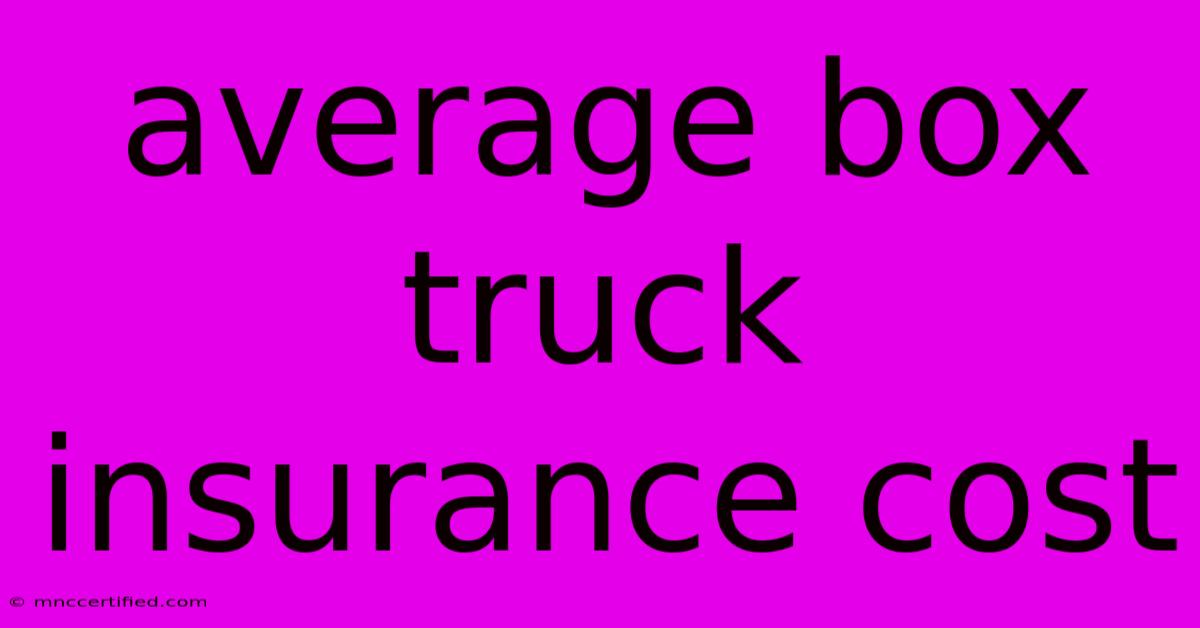Average Box Truck Insurance Cost

Table of Contents
Average Box Truck Insurance Cost: A Comprehensive Guide
Finding the right insurance for your box truck can feel overwhelming. With so many factors influencing the cost, it's crucial to understand what to expect and how to get the best rate. This comprehensive guide will break down the average box truck insurance cost, influencing factors, and strategies for saving money.
Understanding the Variables: What Affects Your Box Truck Insurance Premium?
Several factors determine the price of your box truck insurance. These include:
-
Type of Coverage: The most basic coverage, liability insurance, protects you against claims if you cause an accident. However, you'll likely need more comprehensive coverage, including collision and comprehensive, to protect your investment fully. Comprehensive covers damage from events outside your control (like hail or theft), while collision covers damage from accidents. The more coverage you need, the higher the cost.
-
Your Driving Record: A clean driving history with no accidents or tickets translates to lower premiums. Even minor infractions can significantly impact your rates. Maintaining a spotless record is key to saving money.
-
Your Business Use: How you use your box truck plays a significant role. Commercial use, especially hauling hazardous materials, will generally cost more to insure than personal use. The type of cargo you haul influences risk assessment and, consequently, premiums.
-
Vehicle Details: The year, make, model, and value of your box truck directly impact insurance costs. Newer, more expensive trucks generally cost more to insure. The size of the truck also matters; larger trucks often carry higher premiums.
-
Location: Insurance rates vary based on location. Areas with higher accident rates or theft statistics typically have higher insurance premiums.
-
Deductible: Choosing a higher deductible reduces your monthly premium but increases your out-of-pocket expenses in case of a claim. Finding the right balance between premium and deductible is crucial.
-
Insurance Company: Different insurance companies have different pricing structures. Shopping around and comparing quotes from multiple providers is essential to find the best deal.
What is the Average Cost?
Pinpointing an exact average box truck insurance cost is difficult due to the many variables above. However, expect to pay anywhere from $1,000 to $5,000 or more per year. This broad range reflects the vast differences in individual circumstances. The best way to determine your specific cost is to get multiple quotes from different insurance providers.
Factors Contributing to Higher-Than-Average Costs:
- Multiple Accidents or Traffic Violations: A history of accidents or tickets will drastically increase your premiums.
- High-Value Truck: Insuring a newer, more expensive box truck will naturally cost more.
- Hazardous Materials Transportation: Transporting hazardous goods significantly increases risk and insurance costs.
- High Mileage: Driving your truck for extensive business purposes generally means higher premiums.
Tips for Lowering Your Box Truck Insurance Costs:
- Shop Around: Compare quotes from at least three different insurance providers.
- Maintain a Clean Driving Record: This is crucial for lower premiums.
- Consider a Higher Deductible: A higher deductible will lower your premium, but remember the trade-off.
- Bundle Policies: Some insurers offer discounts for bundling your box truck insurance with other policies, such as auto or home insurance.
- Install Anti-theft Devices: Security features can reduce your premiums.
- Defensive Driving Courses: Completing a defensive driving course can sometimes lower your rates.
- Maintain a Good Credit Score: Your credit score can surprisingly impact your insurance premiums.
Conclusion: Navigating Box Truck Insurance Costs
Obtaining affordable box truck insurance requires careful planning and research. By understanding the factors that influence your premium and employing the strategies outlined above, you can effectively manage your costs and secure the right coverage for your needs. Remember to always compare quotes, maintain a safe driving record, and choose the coverage that best protects your business.

Thank you for visiting our website wich cover about Average Box Truck Insurance Cost. We hope the information provided has been useful to you. Feel free to contact us if you have any questions or need further assistance. See you next time and dont miss to bookmark.
Featured Posts
-
Prescotts Legacy Shaping Rayners Career
Nov 22, 2024
-
Is Aerolase Covered By Insurance
Nov 22, 2024
-
Bengals Steelers Pratts Week Victory Claim
Nov 22, 2024
-
Bengals Star Predicts Week 13 Win
Nov 22, 2024
-
Trump Names Bondi To Us Position
Nov 22, 2024